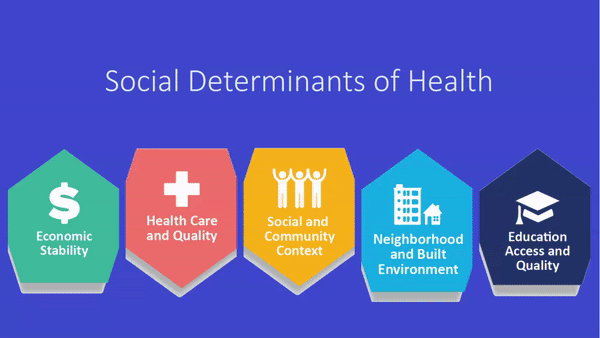|
Social Determinants Of Health
The social determinants of health (SDOH) are the economic and social conditions that influence individual and group differences in health status. They are the health promoting factors found in one's living and working conditions (such as the distribution of income, wealth, influence, and power), rather than individual risk factors (such as behavioral risk factors or genetics) that influence the risk for a disease, or vulnerability to disease or injury. The distributions of social determinants are often shaped by public policies that reflect prevailing political ideologies of the area. The World Health Organization says that "the social determinants can be more important than health care or lifestyle choices in influencing health." and "This unequal distribution of health-damaging experiences is not in any sense a 'natural' phenomenon but is the result of a toxic combination of poor social policies, unfair economic arrangements here the already well-off and healthy become even ... [...More Info...] [...Related Items...] OR: [Wikipedia] [Google] [Baidu] |
Transportation
Transport (in British English), or transportation (in American English), is the intentional movement of humans, animals, and goods from one location to another. Modes of transport include air, land ( rail and road), water, cable, pipeline, and space. The field can be divided into infrastructure, vehicles, and operations. Transport enables human trade, which is essential for the development of civilizations. Transport infrastructure consists of both fixed installations, including roads, railways, airways, waterways, canals, and pipelines, and terminals such as airports, railway stations, bus stations, warehouses, trucking terminals, refueling depots (including fueling docks and fuel stations), and seaports. Terminals may be used both for interchange of passengers and cargo and for maintenance. Means of transport are any of the different kinds of transport facilities used to carry people or cargo. They may include vehicles, riding animals, and pack animals. Vehicle ... [...More Info...] [...Related Items...] OR: [Wikipedia] [Google] [Baidu] |
Health Equity
Health equity arises from access to the social determinants of health, specifically from wealth, power and prestige. Individuals who have consistently been deprived of these three determinants are significantly disadvantaged from health inequities, and face worse health outcomes than those who are able to access certain resources. It is not equity to simply provide every individual with the same resources; that would be equality. In order to achieve health equity, resources must be allocated based on an individual need-based principle. According to the World Health Organization, "Health is a state of complete physical, mental and social well-being and not merely the absence of disease or infirmity". The quality of health and how health is distributed among economic and social status in a society can provide insight into the level of development within that society. Health is a basic human right and human need, and all human rights are interconnected. Thus, health must be discussed ... [...More Info...] [...Related Items...] OR: [Wikipedia] [Google] [Baidu] |
Center For Migration Studies Of New York
The Center for Migration Studies of New York (CMS) is an educational institute and nonpartisan think tank based in New York City that studies domestic immigration and international migration issues. The organization is devoted to public policies that safeguard the dignity and rights of migrants worldwide. In recent years, CMS has been known for producing research addressing the U.S. immigrant detention system, the U.S. and global refugee protection systems, and data on the unauthorized immigrant population in the United States. CMS is a member of the Scalabrini International Migration Network, a global network of migrant shelters, service centers, and other institutions along migrant corridors and in border and destination communities. Publications CMS publishes the '' International Migration Review'', an interdisciplinary journal on migration, refugees, and ethnic group relations, as well as the ''Journal on Migration and Human Security'', a peer-reviewed journal that publishes ... [...More Info...] [...Related Items...] OR: [Wikipedia] [Google] [Baidu] |
United States Centers For Disease Control And Prevention
The Centers for Disease Control and Prevention (CDC) is the national public health agency of the United States. It is a United States federal agency, under the Department of Health and Human Services, and is headquartered in Atlanta, Georgia. The agency's main goal is the protection of public health and safety through the control and prevention of disease, injury, and disability in the US and worldwide. The CDC focuses national attention on developing and applying disease control and prevention. It especially focuses its attention on infectious disease, food borne pathogens, environmental health, occupational safety and health, health promotion, injury prevention and educational activities designed to improve the health of United States citizens. The CDC also conducts research and provides information on non-infectious diseases, such as obesity and diabetes, and is a founding member of the International Association of National Public Health Institutes. [...More Info...] [...Related Items...] OR: [Wikipedia] [Google] [Baidu] |
Centers For Disease Control And Prevention
The Centers for Disease Control and Prevention (CDC) is the national public health agency of the United States. It is a United States federal agency, under the Department of Health and Human Services, and is headquartered in Atlanta, Georgia. The agency's main goal is the protection of public health and safety through the control and prevention of disease, injury, and disability in the US and worldwide. The CDC focuses national attention on developing and applying disease control and prevention. It especially focuses its attention on infectious disease, food borne pathogens, environmental health, occupational safety and health, health promotion, injury prevention and educational activities designed to improve the health of United States citizens. The CDC also conducts research and provides information on non-infectious diseases, such as obesity and diabetes, and is a founding member of the International Association of National Public Health Institutes. [...More Info...] [...Related Items...] OR: [Wikipedia] [Google] [Baidu] |
Health Disparities
Health equity arises from access to the social determinants of health, specifically from wealth, power and prestige. Individuals who have consistently been deprived of these three determinants are significantly disadvantaged from health inequities, and face worse health outcomes than those who are able to access certain resources. It is not equity to simply provide every individual with the same resources; that would be equality. In order to achieve health equity, resources must be allocated based on an individual need-based principle. According to the World Health Organization, "Health is a state of complete physical, mental and social well-being and not merely the absence of disease or infirmity". The quality of health and how health is distributed among economic and social status in a society can provide insight into the level of development within that society. Health is a basic human right and human need, and all human rights are interconnected. Thus, health must be discusse ... [...More Info...] [...Related Items...] OR: [Wikipedia] [Google] [Baidu] |
Community Health Centers In The United States
The community health center (CHC) in the United States is the dominant model for providing integrated primary care and public health services for the low-income and uninsured, and represents one use of federal grant funding as part of the country's health care safety net. The health care safety net can be defined as a group of health centers, hospitals, and providers willing to provide services to the nation's uninsured and underserved population, thus ensuring that comprehensive care is available to all, regardless of income or insurance status. According to the U.S. Census Bureau, 29 million people in the country (9.1% of the population) were uninsured in 2015. Many more Americans lack adequate coverage or access to health care. These groups are sometimes called "underinsured". CHCs represent one method of accessing or receiving health and medical care for both underinsured and uninsured communities. CHCs are organized as non-profit, clinical care providers that operate under c ... [...More Info...] [...Related Items...] OR: [Wikipedia] [Google] [Baidu] |
Affordable Care Act
The Affordable Care Act (ACA), formally known as the Patient Protection and Affordable Care Act and colloquially known as Obamacare, is a landmark U.S. federal statute enacted by the 111th United States Congress and signed into law by President Barack Obama on March 23, 2010. Together with the Health Care and Education Reconciliation Act of 2010 amendment, it represents the U.S. healthcare system's most significant regulatory overhaul and expansion of coverage since the enactment of Medicare and Medicaid in 1965. The ACA's major provisions came into force in 2014. By 2016, the uninsured share of the population had roughly halved, with estimates ranging from 20 to 24 million additional people covered. The law also enacted a host of delivery system reforms intended to constrain healthcare costs and improve quality. After it went into effect, increases in overall healthcare spending slowed, including premiums for employer-based insurance plans. The increased coverage was du ... [...More Info...] [...Related Items...] OR: [Wikipedia] [Google] [Baidu] |
Political Empowerment
Empowerment is the degree of autonomy and self-determination in people and in communities. This enables them to represent their interests in a responsible and self-determined way, acting on their own authority. It is the process of becoming stronger and more confident, especially in controlling one's life and claiming one's rights. Empowerment as action refers both to the process of self-empowerment and to professional support of people, which enables them to overcome their sense of powerlessness and lack of influence, and to recognize and use their resources. As a term, empowerment originates from American community psychology and is associated with the social scientist Julian Rappaport (1981). However, the roots of empowerment theory extend further into history and are linked to Marxist sociological theory. These sociological ideas have continued to be developed and refined through Neo-Marxist Theory (also known as Critical Theory). In social work, empowerment forms a practical ... [...More Info...] [...Related Items...] OR: [Wikipedia] [Google] [Baidu] |
Gender Equality
Gender equality, also known as sexual equality or equality of the sexes, is the state of equal ease of access to resources and opportunities regardless of gender, including economic participation and decision-making; and the state of valuing different behaviors, aspirations and needs equally, regardless of gender. Gender equality is the goal, while gender neutrality and gender equity are practices and ways of thinking that help in achieving the goal. Gender parity, which is used to measure gender balance in a given situation, can aid in achieving gender equality but is not the goal in and of itself. Gender equality is more than just equal representation, it is strongly tied to women's rights, and often requires policy changes. , the global movement for gender equality has not incorporated the proposition of genders besides women and men, or gender identities outside of the gender binary. UNICEF says gender equality "means that women and men, and girls and boys, enjoy the s ... [...More Info...] [...Related Items...] OR: [Wikipedia] [Google] [Baidu] |
Resource Depletion
Resource depletion is the consumption of a resource faster than it can be replenished. Natural resources are commonly divided between renewable resources and non-renewable resources (see also mineral resource classification). Use of either of these forms of resources beyond their rate of replacement is considered to be resource depletion. The value of a resource is a direct result of its availability in nature and the cost of extracting the resource, the more a resource is depleted the more the value of the resource increases. There are several types of resource depletion, the most known being: Aquifer depletion, deforestation, mining for fossil fuels and minerals, pollution or contamination of resources, slash-and-burn agricultural practices, soil erosion, and overconsumption, excessive or unnecessary use of resources. Resource depletion is most commonly used in reference to farming, fishing, mining, water usage, and consumption of fossil fuels. Depletion of wildlife p ... [...More Info...] [...Related Items...] OR: [Wikipedia] [Google] [Baidu] |









.jpg)
